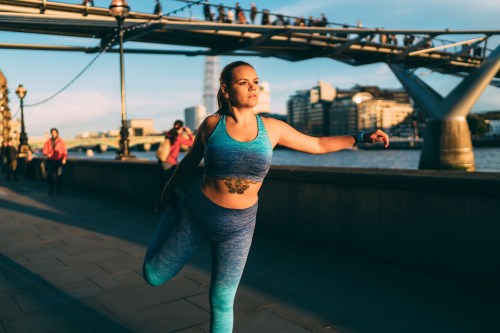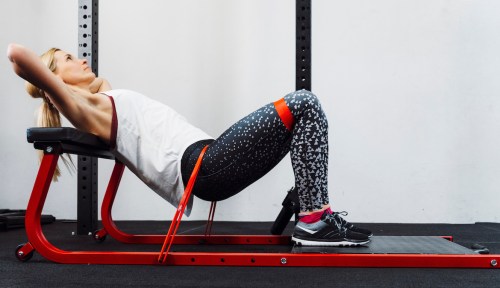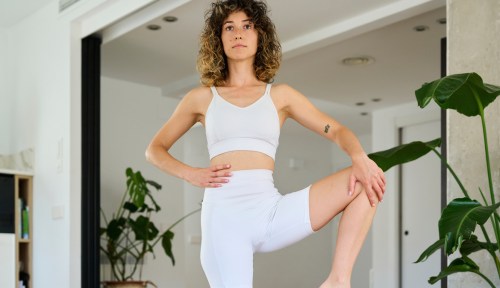With the added stress, isolation, and disrupted schedules that the pandemic has caused, exercise maybe isn’t everyone’s biggest priority right now. So if you haven’t been crushing your workouts lately, you’re not alone, and you shouldn’t feel bad about it. That said, the benefits of short workouts are legit—which is why experts recommend doing some sort of regular exercise, even if it’s not to your best athletic abilities.
Experts in This Article
fitness trainer and host of the 40+ Fitness podcast
licensed mental health counselor and fitness trainer
After asking a number of top fitness pros and a mental health expert, the general consensus is that exercising—in any form—may be more important now than it has ever been. That’s because there are both physical and mental benefits of moving your body through short, lower-intensity workouts. Keep scrolling for what they are.
1. They help manage stress and boost your mood
Because of the strong connection between physical and mental health, licensed mental health counselor Kelly Keck (who’s also a personal trainer) asks her patients to keep tabs on their physical activity as a measure of overall wellness habits. This is because, with the major life disruptions that come with the pandemic, mental and emotional strain can have a “profound impact” on how people view themselves.
“The nervous system will go into a perpetual fight or flight survival mode [when stressed], in the same way as if you’d gone through a serious trauma of some sort,” says Keck. “Exercise offers an antidote, and improves self-awareness and self-esteem, along with cardiovascular health, strength, and flexibility.” To reap these benefits, you don’t have to slot in an hour-long workout every single day, either. “Any movement, including a morning or evening walk, releases endorphins that interact with the pain receptors in your brain and heightens positive feelings in the body,” she says. So you can move however you like.
2. They give you control amidst the chaos
At a time like this, it’s not uncommon to feel a sense of helplessness. This is something that Keck says can be helped with a daily workout, which can give a sense of control. “Under this imposed quarantine, working from home, missing out on family functions, you lose your ability for choice,” she says. “But moving your body will offer you 20 or 30 minutes of mental clarity [that] you aren’t getting elsewhere.”
Besides the benefits to your body’s strength and cardiovascular health, Keck notes that dedicating time to exercise allows you to check-in with yourself. Her tip? “Use your workout session as a time to proactively identify the specific things you might need, both physically and emotionally,” she says, pointing to things like getting outdoors more often or spending less time on social media examples. “This time is solely yours: You’re in control of it, so have fun with it.”
3. They improve your overall health
Science backs up the idea that short workouts are just as effective to your overall health as longer ones, which is why you’ll find plenty of fitness trainers (like Nike master trainer Joe Holder’s “exercise snacks”) recommending quickie exercise sessions spread throughout your day or week. “Getting up from your desk and walking for five minutes is going to give you a ton more energy than if you sit there for extended periods of time,” says Allan Misner, a fitness trainer and host of the 40+ Fitness Podcast.
Your short workouts don’t necessarily have to be intense, either. “Harder [exercise] isn’t better,” says Misner. “Gentle little nudges to do just a bit more, or something at all, are going to give your body just enough extra stimulus in order to improve overall health.” Bring on all of the low-impact workouts.
4. They help you form healthy habits
Another perk of doing regular, short workout sessions is that they get you into the mindset of building habits. One of the easiest ways to turn movement into a regular activity is to create a workout schedule. If you just slot in quickie exercise sessions into your calendar as you would with work meetings, it’ll be easier to stay on top of your physical activity.
To get you started, try this heart-opening yoga flow that takes less than 10 minutes to do:
Sign Up for Our Daily Newsletter
Get all the latest in wellness, trends, food, fitness, beauty, and more delivered right to your inbox.
Got it, you've been added to our email list.











